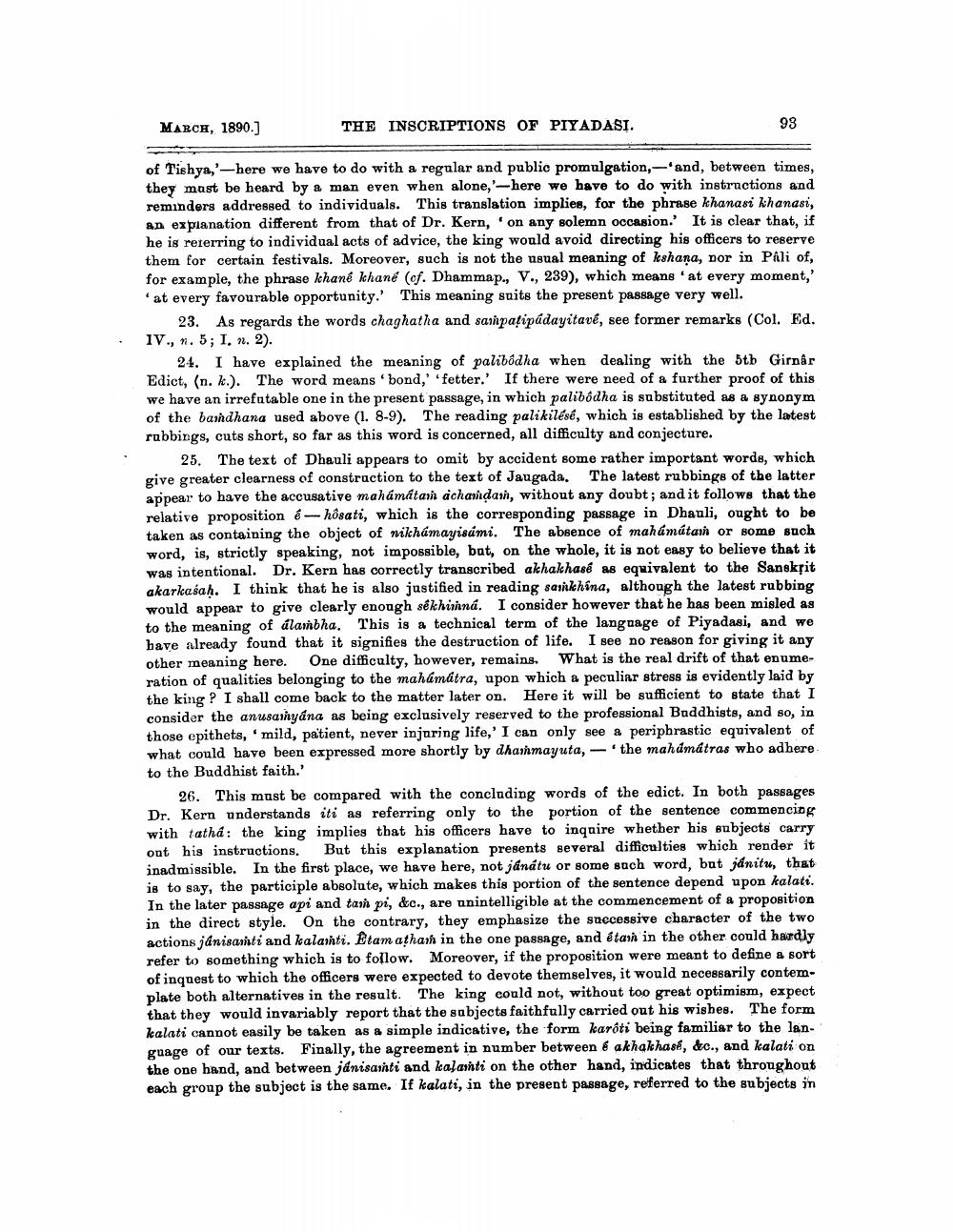________________
MARCH, 1890.]
THE INSCRIPTIONS OF PIYADASI.
93
of Tishya,' here we have to do with a regular and public promulgation,-'and, between times, they must be heard by a man even when alone,'-here we have to do with instructions and reminders addressed to individuals. This translation implies, for the phrase khanasi khanasi, an explanation different from that of Dr. Kern, on any solemn occasion. It is clear that, if he is referring to individual acts of advice, the king would avoid directing his officers to reserve them for certain festivals. Moreover, such is not the usual meaning of kshana, nor in Pali of, for example, the phrase Ichanê khané (of. Dhammap., V., 239), which means at every moment,' at every favourable opportunity.' This meaning suits the present passage very well.
23. As regards the words chaghatha and sampațipadayitavé, see former remarks (Col. Ed. IV., n. 5; 1. n. 2).
24. I have explained the meaning of palibodha when dealing with the 5tb Girnar Edict, (n. k.). The word means 'bond,' fetter.' If there were need of a further proof of this we have an irrefutable one in the present passage, in which palibódha is substituted as a synonym of the bandhana used above (1. 8-9). The reading palikilésé, which is established by the latest rubbings, cuts short, so far as this word is concerned, all difficulty and conjecture.
25. The text of Dhauli appears to omit by accident some rather important words, which give greater clearness of construction to the text of Jaugada. The latest rubbings of the latter appear to have the accusative mahámítani achandain, without any doubt; and it follows that the relative proposition é hôsati, which is the corresponding passage in Dhauli, ought to be taken as containing the object of nikhámayisámi. The absence of mahámátar or some such word, is, strictly speaking, not impossible, bat, on the whole, it is not easy to believe that it was intentional. Dr. Kern has correctly transcribed akhakhase as equivalent to the Sanskțit akarkasah. I think that he is also justified in reading sasakhina, although the latest rubbing would appear to give clearly enough sékhirná. I consider however that he has been misled as to the meaning of lambha. This is a technical term of the language of Piyadasi, and we have already found that it signifies the destruction of life. I see no reason for giving it any other meaning here. One difficulty, however, remains. What is the real drift of that enumeration of qualities belonging to the mahámátra, upon which a peculiar stress is evidently laid by the king ? I shall come back to the matter later on. Here it will be sufficient to state that I consider the anusanyána as being exclusively reserved to the professional Buddhists, and so, in those epithets, mild, patient, never injuring life,' I can only see a periphrastic equivalent of what could have been expressed more shortly by dharmayuta, - 'the mahdmatras who adhere to the Buddhist faith.'
26. This must be compared with the concluding words of the edict. In both passages Dr. Kern understands iti as referring only to the portion of the sentence commencing with tatha: the king implies that his officers have to inquire whether his subjects carry ont his instructions. But this explanation presents several difficulties which render it inadmissible. In the first place, we have here, not janátu or some such word, but jdnitu, that is to say, the participle absolute, which makes this portion of the sentence depend upon kalati. In the later passage api and tam pi, &c., are unintelligible at the commencement of a proposition in the direct style. On the contrary, they emphasize the successive character of the two actions janisanti and kalanti. Etam atharn in the one passage, and étash in the other could hardly refer to something which is to follow. Moreover, if the proposition were meant to define a sort of inquest to which the officers were expected to devote themselves, it would necessarily contemplate both alternatives in the result. The king could not, without too great optimism, expect that they would invariably report that the subjects faithfully carried out his wishes. The form kalati cannot easily be taken as a simple indicative, the form karóti being familiar to the language of our texts. Finally, the agreement in number between & akhakhasé, &c., and kalati on the one hand, and between jánisanti and kalanti on the other hand, indicates that throughout each group the subject is the same. If kalati, in the present passage, referred to the subjects in




